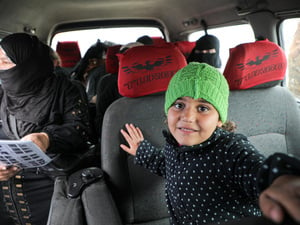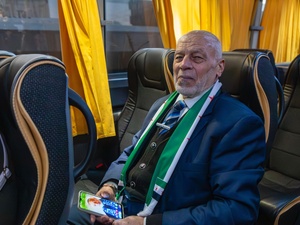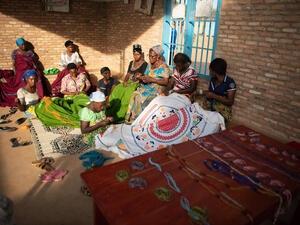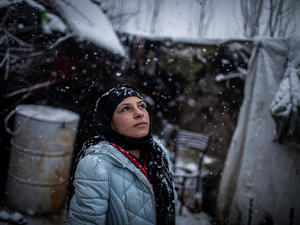After the battle, Aleppo residents want to get back to work
After the battle, Aleppo residents want to get back to work

Displaced east Aleppo resident Omar kneels beside a stove for warmth. He is among some 50,000 residents of the ancient Syrian city's eastern neighbourhoods displaced to west Aleppo by war.
AL SALAT COLLECTIVE SHELTER, Aleppo, Syria – As the final battle for control of east Aleppo raged around them, Abo Ahmad and his family counted themselves lucky just to escape with their lives.
But now that the guns have gone silent, he is among more than 50,000 former residents of the ancient Syrian city’s battle-ravaged east who are currently displaced in the western part of the city. And he is eager to get back to work.
“I want to get our lives back, and to start working so I can provide for my family without depending on anyone,” said Ahmad, who has been looking for a job – so far unsuccessfully – since arriving at the Al Salat shelter in early December with his wife and four children.
“I want to get our lives back, and to start working so I can provide for my family without depending on anyone.”
“Now that we’ve crossed to safety, I want to go back to being productive. This is not the kind of life I want, waiting in queues for humanitarian assistance,” he added.
In total, more than 120,000 individuals are displaced across Aleppo, one of the world’s oldest continually inhabited cities and Syria’s largest population centre and commercial hub before the country descended into conflict in 2011.
UNHCR, the UN Refugee Agency, and its partners in the Al Salat collective shelter and throughout Aleppo are promoting jobs and livelihoods as a key part of the effort to help the city and its people recover from nearly six years of war. Among the services being offered are vocational training courses and start-up business grants.
“Many of the families we meet are eager to restart their lives, and most inquiries are about livelihood opportunities and the establishment of school for their kids”, said Sajjad Malik, UNHCR’s Representative in Syria, during a recent visit to Aleppo.
The brutal fight for control of Aleppo raged for more than four years before government forces re-established control over the whole city in December, following a months-long siege of eastern neighbourhoods.
Traders from the old city’s damaged market are also looking to return and start over, among them Mohamad, who owns six shops there. “I will slowly fix and repair things here,” he said during a visit to a street flanked by stores with their shutters blasted off and interiors strewn with rubble. “We will work together and rebuild this so we can work here again,” he added.
“I want to start working as soon as I can, but I… need help as the tools I have now are not enough.”
Another former resident of east Aleppo currently displaced in the west of the city is Omar, a 43-year-old blacksmith who specializes in traditional Arabic designs. He was able to continue working to support his family for much of the past four years, but was finally forced to stop in July when the east of the city came under siege.
Omar fled to the west with his wife and four daughters after his only son was killed in a mortar strike. When they left, he took his remaining tools with him in order to resume working when he could.
“I want to start working again as soon as I can, but I realize I need help as the tools I have now are not enough,” he said. Omar estimates that he will need to spend around 150,000 Syrian pounds (US$300) to buy the new tools he needs. “Of that amount, I only have US$10 now,” he added ruefully.
“The way I am now, I can’t seem to come up with a plan for the future,” Omar said. “All I can do now is stay in this shelter and survive, with my family, depending on the humanitarian assistance we receive.”









